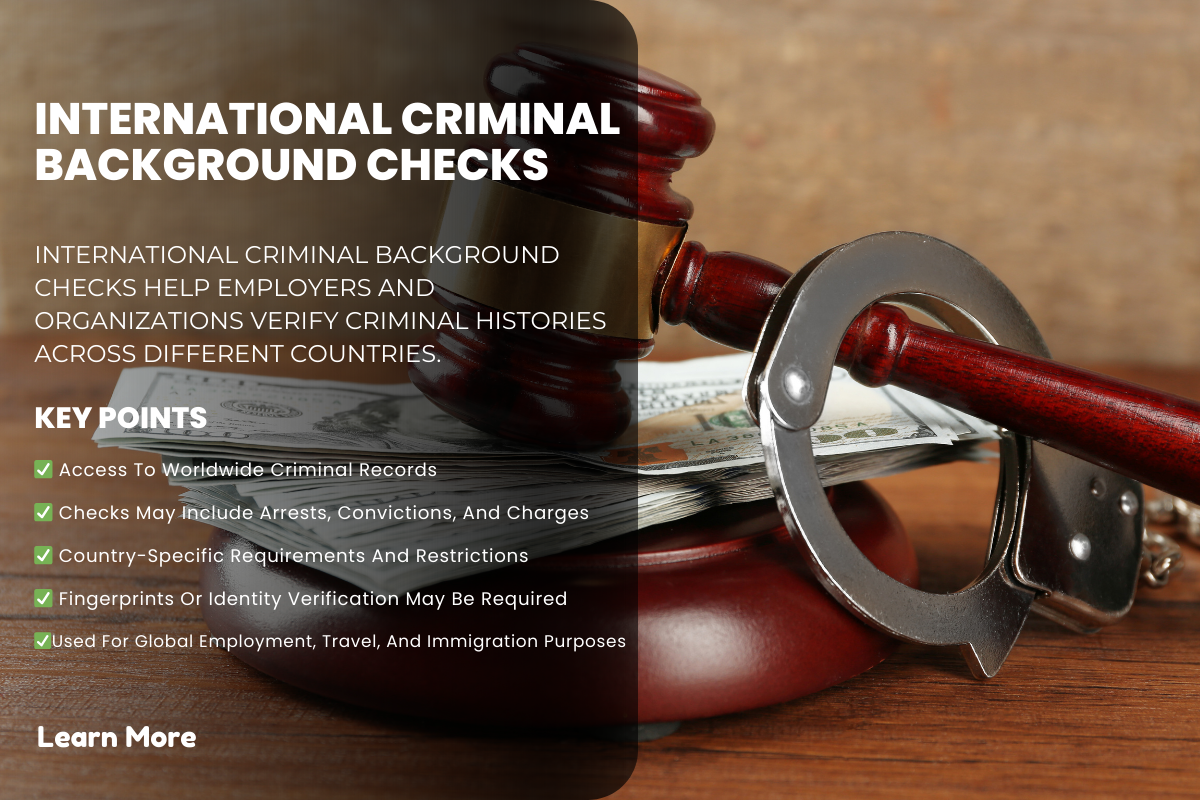
Introduction and Overview of International Criminal Background Checks
In an increasingly globalized world, businesses are expanding their reach to recruit talent from all corners of the globe. This global recruitment strategy brings numerous benefits, such as access to diverse skill sets, new perspectives, and the ability to tap into new markets. However, this expansion also presents unique challenges—particularly when it comes to ensuring that international hires meet the same standards for safety, integrity, and compliance as local hires. One of the most important tools to mitigate these risks is the international criminal background check.
An international criminal background check helps employers verify the criminal history of candidates who have lived, worked, or studied abroad. Given the nature of the global workforce, these checks are now more important than ever, ensuring that individuals with a history of criminal behavior are identified before they can potentially harm the organization or other employees. This article will explore what international criminal background checks are, why they are important for employers, and the potential challenges that come with conducting them.
What Is an International Criminal Background Check?
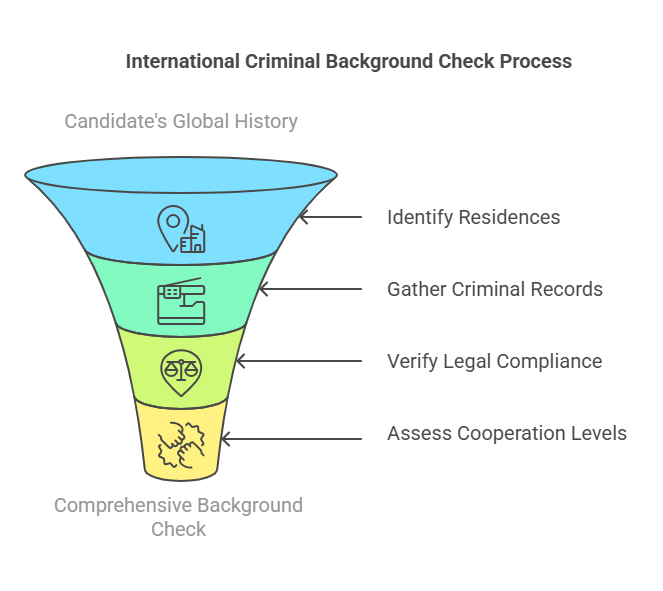
An international criminal background check is a process through which an employer examines the criminal history of a candidate who has resided or worked in countries other than the one where they are currently applying for a job. These checks extend beyond the standard national background checks by exploring criminal records in multiple countries where the individual may have had significant life experiences—such as previous employment, residence, or education.
The checks provide insights into whether a person has committed serious criminal offenses like fraud, theft, assault, or drug trafficking in another country. However, it’s essential to note that international criminal background checks can vary in their scope and depth based on several factors, including the laws of the country being investigated and the cooperation level between different countries’ law enforcement agencies.
Unlike domestic checks, which are typically processed through government-run databases or police records, international checks may involve accessing criminal records through foreign authorities, commercial data providers, or a combination of both. This added complexity can make the process more time-consuming and expensive, but it is an indispensable part of ensuring a safe hiring process.
Why Are International Criminal Background Checks Important?
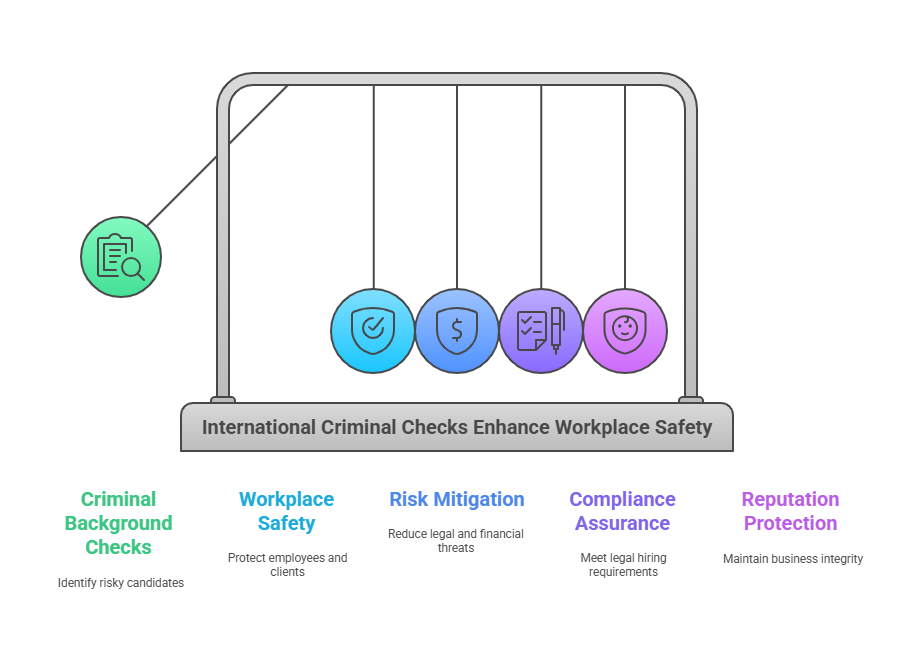
The importance of international criminal background checks has grown in recent years due to the increasing trend of businesses hiring from a global talent pool. Here are some key reasons why conducting these checks is critical for employers:
1. Ensuring Workplace Safety
One of the primary concerns for any business is ensuring the safety of its employees and clients. Employers have a duty to create a safe and secure environment for everyone working within the organization. By conducting international criminal background checks, businesses can identify candidates with violent criminal histories or other concerning behaviors that could pose a risk to workplace safety. This is especially important for industries dealing with sensitive information or high-security roles, such as finance, healthcare, or defense.
2. Risk Mitigation
Hiring employees with criminal backgrounds—especially those who have committed serious offenses—can significantly increase a company’s risk. Employees with a history of crimes like fraud, embezzlement, or money laundering could pose a threat to the financial integrity of the business. In some cases, hiring individuals without thoroughly vetting their criminal backgrounds can also expose a company to legal liability, regulatory penalties, or reputational damage.
3. Global Mobility and Relocation
In today’s interconnected world, employees frequently relocate across borders for career advancement or job assignments. In some cases, companies hire individuals from overseas to fill positions in their domestic offices. As part of the hiring process, an international criminal background check becomes necessary to ensure the candidate has not committed any criminal activities in other countries that may affect their eligibility for employment or security clearance.
4. Compliance with Legal and Regulatory Requirements
Certain industries or roles require employers to comply with strict regulations related to the hiring of individuals with criminal backgrounds. For example, employers in the financial sector may be required to verify that job candidates have not been involved in financial crimes such as fraud or money laundering. Additionally, countries may have specific regulations for verifying the criminal background of foreign workers. In some cases, international criminal background checks are also mandated by immigration authorities when applicants are seeking visas, residence permits, or citizenship.
5. Avoiding Legal and Reputational Risks
Employers who fail to conduct thorough international criminal background checks may expose themselves to significant legal risks. For example, if an employee with a history of violent crime or embezzlement causes harm to the company or other employees, the business could be held legally liable for negligence in its hiring process. In addition, a scandal involving a criminal employee can damage the reputation of a business, especially if the crime is made public. Ensuring that potential hires are thoroughly vetted—especially those coming from international locations—helps businesses avoid these costly mistakes.
Common Reasons for Conducting International Criminal Background Checks
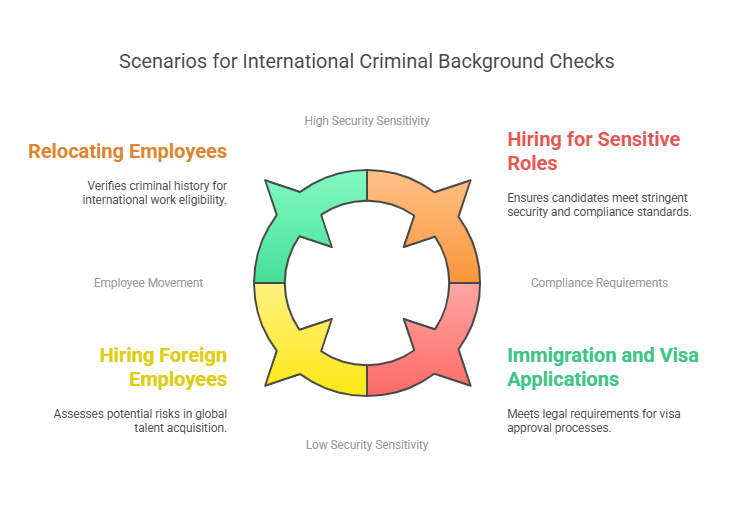
International criminal background checks are requested for various reasons, depending on the employer’s specific needs and the nature of the position being filled. Below are the most common scenarios where these checks are conducted:
1. Hiring Foreign Employees
As more businesses hire from an international pool of talent, the need for international criminal background checks has become more prevalent. When hiring someone who has worked or resided abroad, it is important to verify that the candidate has no criminal history that would pose a risk to the company. Positions that require access to confidential data, financial systems, or sensitive projects especially benefit from this screening.
2. Relocating Employees Across Borders
Global companies often move employees between offices in different countries. Employees relocating to a different country for work may require an international criminal background check to ensure they are compliant with the host country’s hiring laws, as well as to ensure they do not have any criminal records in their home country that could affect their eligibility for employment or visa approval.
3. Hiring for Sensitive or High-Security Roles
Certain roles—such as those in government, defense, finance, or healthcare—demand a higher level of scrutiny during the hiring process. Employers in these fields often conduct international criminal background checks to ensure that candidates do not have a criminal history that could jeopardize national security, the organization’s reputation, or client trust.
4. Immigration and Visa Applications
As part of the visa or immigration process, individuals seeking to enter a country for work may be required to undergo an international criminal background check. This is particularly relevant for individuals applying for visas to work in sensitive industries or roles where national security concerns are paramount.
5. Contractual or Regulatory Obligations
Certain industries or countries may have legal requirements that necessitate background checks on international employees or contractors. For instance, financial institutions and government contractors often have strict regulations to follow, which may include international criminal background checks.
Potential Challenges of Conducting International Criminal Background Checks
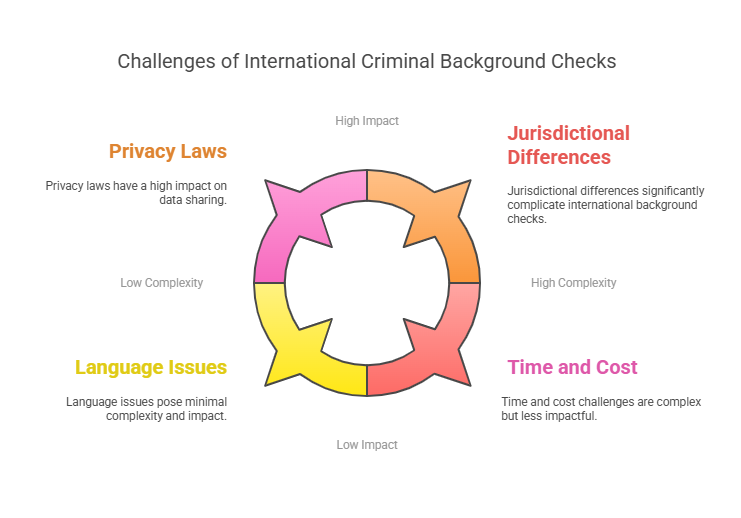
While the importance of international criminal background checks is clear, employers must be aware of several challenges that may arise during the process. Some of these challenges include:
1. Jurisdictional Differences
Not all countries have the same systems in place for recording criminal activity, and many countries have strict regulations regarding the sharing of such information. While some nations maintain extensive criminal databases, others may lack centralized record-keeping systems, or may be unwilling to share this information with foreign parties. As a result, conducting thorough checks in certain countries can be difficult, or even impossible, without the proper legal channels or access.
2. Language and Translation Issues
In some cases, criminal records in foreign countries may be documented in a language unfamiliar to the employer. This can create significant challenges when verifying the details of the criminal history. Employers may need to hire professional translators or work with background check companies that have access to local experts to ensure that the information is accurately interpreted.
3. Privacy Laws and Data Protection Regulations
Privacy laws vary widely across countries, and these laws often dictate what personal information can be collected, stored, and shared. In some countries, the disclosure of criminal records may be highly restricted or prohibited by law. Employers must ensure that they comply with international data protection regulations, such as the General Data Protection Regulation (GDPR) in the European Union, when collecting and processing background check data.
4. Time and Cost
International background checks can be time-consuming and costly. The need to obtain information from multiple countries, often requiring legal paperwork, translations, or coordination with local authorities, can delay the process. Additionally, employers may need to work with third-party background check services that specialize in international records, which could incur additional fees.
How to Conduct an International Criminal Background Check: Process, Best Practices, and Provider Options
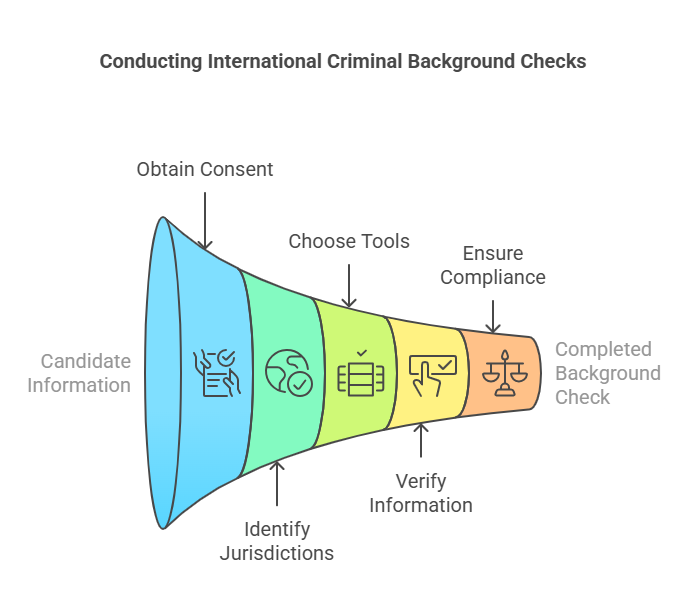
Process and Best Practices for Conducting International Criminal Background Checks
Once employers recognize the importance of conducting international criminal background checks, the next step is to understand how the process works and what best practices they should follow. The process of conducting these checks can vary depending on the country, the resources available, and the complexity of the candidate’s history. This section will explore the essential steps involved in conducting an international criminal background check, highlight common challenges, and provide recommendations for best practices to ensure compliance and accuracy.
The Process of Conducting International Criminal Background Checks
Conducting an international criminal background check involves multiple stages, including obtaining consent, selecting appropriate databases, verifying information, and ensuring legal compliance. Here’s an overview of the typical process:
1. Obtaining Consent
Before any background check can begin, employers must obtain the consent of the candidate. This is a standard procedure in many countries and is especially important in jurisdictions where privacy and data protection laws are stringent. Consent ensures that the candidate is aware of the background check and allows the employer to collect and use personal information legally.
Employers should ensure that the consent form is clear and explicitly covers international criminal background checks. The consent document should outline the scope of the check, including the countries or regions where records will be searched.
2. Identifying Relevant Jurisdictions
One of the most challenging aspects of conducting an international criminal background check is determining which countries or jurisdictions to investigate. Employers need to identify where the candidate has lived, worked, or studied in the past. The countries selected for the check should correspond to the candidate’s previous addresses or employment locations. This may require asking the candidate to provide detailed information about their previous residences, employers, or educational institutions.
For example, if a candidate has lived in three different countries, the employer may need to request background checks from all three nations to ensure a complete assessment of the candidate’s criminal history.
3. Choosing the Right Tools and Resources
Once the relevant jurisdictions are identified, employers must decide how to conduct the background check. Depending on the country, this may involve searching public criminal record databases, obtaining information directly from police or law enforcement agencies, or using third-party services that specialize in international background checks.
Some countries have national databases that allow employers to conduct checks directly, while in others, it may be necessary to rely on local authorities, embassies, or specialized agencies to obtain the required information.
Using a third-party background check service is often a good option for employers, as these services typically have experience navigating international legal and data protection requirements. Companies like Rapid Hire Solutions, for example, offer international background checks, leveraging local experts and partnerships with law enforcement in various countries to ensure that the information gathered is accurate and comprehensive.
4. Verifying Information
After the criminal record is obtained, it’s crucial to verify the authenticity of the data. Verification can involve confirming the candidate’s identity and ensuring that the criminal record belongs to the correct individual. Employers must carefully review the details in the criminal history report to ensure there are no errors, such as incorrect names, dates of birth, or other discrepancies.
To avoid the risk of mistaken identity, employers may need to cross-reference the criminal record with other documents provided by the candidate, such as a passport, previous job records, or academic transcripts.
5. Ensuring Legal Compliance
Compliance with local and international laws is essential when conducting international criminal background checks. Employers must ensure that they adhere to the legal and regulatory frameworks in both the country where the employer is based and the countries where the checks are conducted.
Key considerations include:
- Data Protection Laws: Many countries, including those in the European Union (under the GDPR) and other regions, have strict rules governing the collection and processing of personal data. Employers must ensure they comply with these regulations when handling sensitive information such as criminal records.
- Fair Employment Practices: Employers must be cautious not to violate anti-discrimination laws by using criminal background checks in a discriminatory manner. For instance, in some jurisdictions, employers cannot automatically reject candidates based on certain types of criminal convictions, especially if they occurred many years ago.
Common Challenges in Conducting International Criminal Background Checks
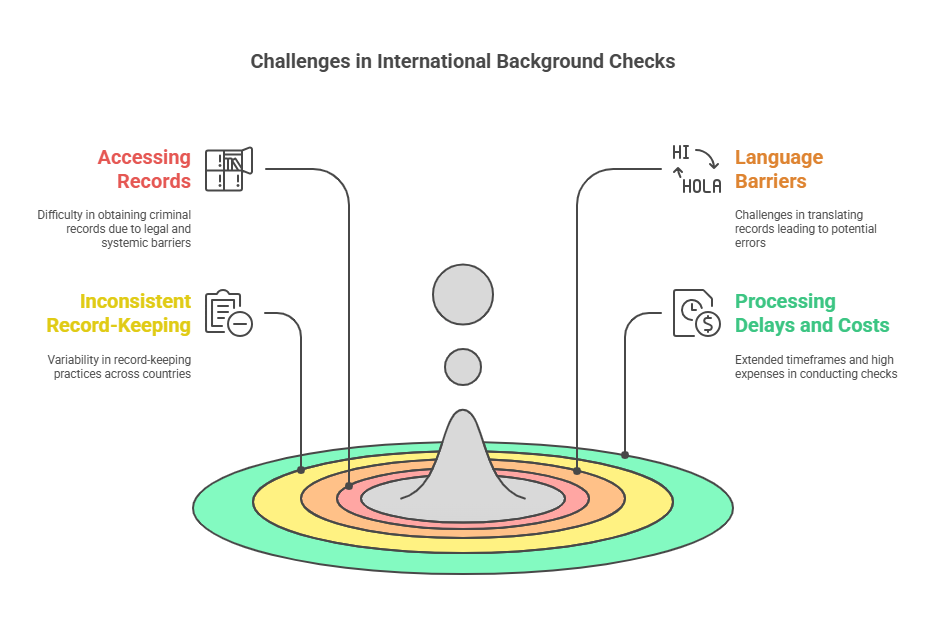
While the process is essential for ensuring a safe and compliant hiring process, it can be complex due to a variety of challenges. Below are some of the most common hurdles employers face when conducting international criminal background checks:
1. Accessing Criminal Records in Certain Countries
Some countries have limited or restricted access to criminal records, especially if the individual has not been convicted of a major crime. In countries with less developed criminal justice systems, records may not be digitized or publicly accessible, making it difficult to obtain information.
Additionally, certain countries may not share criminal records with foreign entities due to sovereignty issues or government policies. In these cases, employers may need to rely on local contacts, specialized background check companies, or third-party intermediaries who have experience working within those countries.
2. Language Barriers
Language barriers can be a significant challenge when conducting international criminal background checks. Criminal records in many countries are documented in local languages, and translation errors can lead to incorrect or incomplete information. To ensure accuracy, employers may need to work with translation experts who can provide precise interpretations of the criminal records.
For instance, a criminal record written in Mandarin or Arabic may require a skilled translator who is familiar with both the legal terminology and the candidate’s personal details. This adds to the time and cost of the background check process.
3. Inconsistent Record-Keeping Across Countries
Not all countries maintain centralized databases for criminal records, and some may only document major offenses. As a result, obtaining a complete criminal history may be difficult in some regions. Countries with less formalized record-keeping systems may only retain partial or outdated information, making it harder for employers to conduct thorough checks.
In these cases, employers may need to adjust their expectations or conduct additional investigations to ensure that a comprehensive background check is performed.
4. Delays in Processing and High Costs
International criminal background checks are often more time-consuming and expensive than domestic checks. The need to coordinate with multiple jurisdictions, comply with legal requirements, and possibly deal with language barriers can all contribute to significant delays. In some cases, the process can take weeks or even months to complete.
The added complexity of working with international authorities, translators, and legal experts also increases the cost of conducting international checks. Employers should be prepared for these potential delays and budget accordingly.
Best Practices for Employers
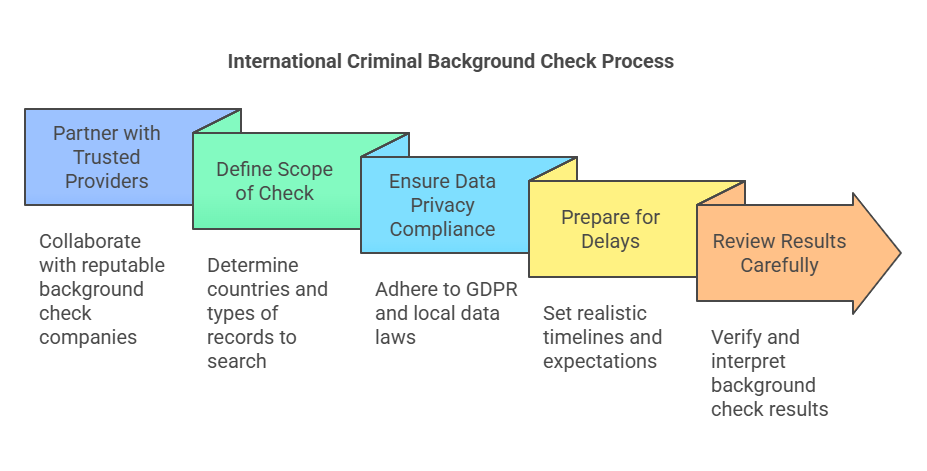
To ensure that international criminal background checks are conducted efficiently, accurately, and in compliance with relevant laws, employers should follow these best practices:
- Partner with Trusted Background Check Providers
Working with reputable third-party providers that specialize in international criminal background checks can streamline the process. These providers have experience navigating the complexities of international laws, data protection regulations, and language barriers, ensuring that the checks are thorough and compliant.
- Clearly Define the Scope of the Check
Employers should clearly define the scope of the background check before initiating the process. This includes identifying the countries to be checked and the types of criminal records that will be searched for. Clear communication with the candidate is also important, as this will help ensure the employer has the correct information for the check.
- Maintain Data Privacy and Legal Compliance
Employers must ensure that they comply with all data privacy laws when collecting, storing, and processing criminal background information. This includes adhering to international regulations such as the GDPR, as well as local laws in the countries where the checks are conducted.
- Prepare for Potential Delays
Given the complexities involved in conducting international background checks, employers should be prepared for delays. Establishing a clear timeline with the background check provider and setting realistic expectations for candidates is essential.
- Review and Interpret Results Carefully
After receiving the criminal background report, employers should carefully review the results and verify the information before making a hiring decision. If there are any discrepancies or uncertainties, further investigation may be necessary to ensure the candidate’s criminal history is accurately represented.
Legal Aspects, FAQs, and Conclusion of International Criminal Background Checks
Now we’ll delve into the legal considerations and compliance requirements that employers must adhere to when conducting international criminal background checks. This section also includes frequently asked questions (FAQs) related to international background checks, providing further clarity on common concerns and ensuring employers are fully informed before proceeding with international hiring practices.
Legal Considerations and Compliance for International Criminal Background Checks
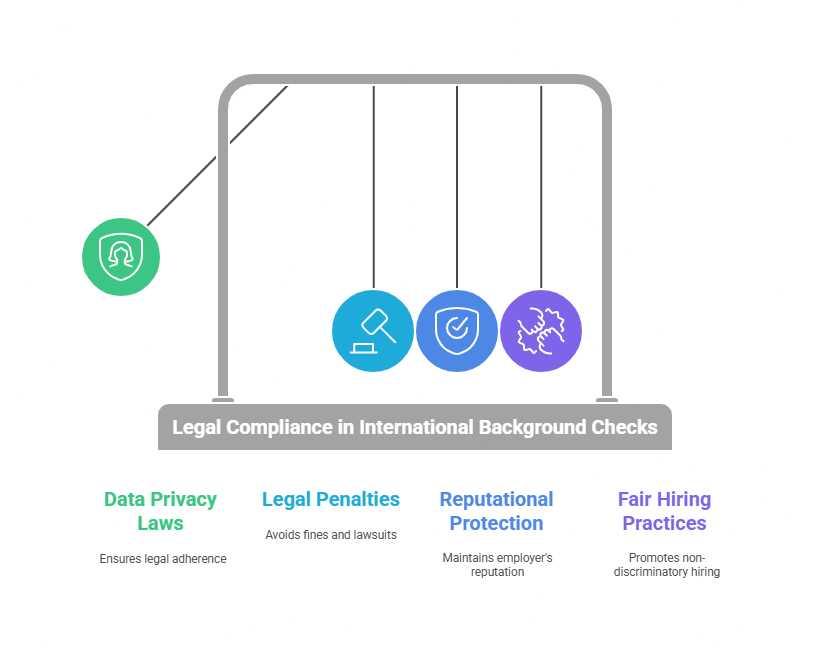
Conducting international criminal background checks requires navigating a complex legal landscape, as various countries have different laws governing data protection, criminal record privacy, and the permissible use of such records in employment decisions. Employers must ensure they comply with both the domestic and international legal requirements involved in the hiring process.
1. Data Privacy and Protection Laws
One of the most important legal aspects of conducting international criminal background checks is ensuring compliance with data privacy and protection laws. In many countries, sensitive personal data, including criminal history, is strictly protected. Failing to comply with these laws can result in legal actions, penalties, or reputational damage.
For instance, in the European Union, the General Data Protection Regulation (GDPR) governs the processing of personal data, including criminal records. Under the GDPR, employers must obtain explicit consent from the candidate before collecting or processing any data related to criminal convictions. Additionally, employers must ensure that the data is stored securely and used solely for the purpose of hiring decisions.
In the United States, while there is no single, comprehensive data privacy law, employers must be mindful of various regulations, including the Fair Credit Reporting Act (FCRA), which governs how background checks are conducted and what information can be used to make hiring decisions. Employers must also comply with state-specific laws, as some states have additional rules regarding the use of criminal records in employment.
2. International Regulations and Bilateral Agreements
Many countries have bilateral or multilateral agreements that facilitate the sharing of criminal records and other sensitive data. These agreements may dictate how criminal background information is exchanged and what procedures employers must follow when requesting records from foreign governments.
For example, the EU-U.S. Privacy Shield Framework governs the transfer of personal data, including criminal history, between the European Union and the United States. Employers must ensure that they adhere to these agreements, as non-compliance can lead to delays or rejection of the background check request.
Employers must also understand the legal restrictions in specific countries regarding the release of criminal information. For example, in some countries, only certain types of criminal convictions are disclosed, or the information may only be accessible to government agencies rather than private organizations. Employers should work with legal professionals or trusted background check agencies to ensure compliance with these diverse legal systems.
3. Fair Use of Criminal Background Information
In many jurisdictions, there are laws in place to ensure that criminal background checks are used fairly and non-discriminatorily. Employers must be cautious when using criminal records to make hiring decisions, as using this information improperly can lead to discrimination claims.
For example, the Ban the Box movement, which has been adopted by several U.S. states and municipalities, prohibits employers from asking about criminal history on job applications. In these jurisdictions, employers can only inquire about criminal convictions after an initial interview or once a conditional job offer has been made. This movement is designed to prevent discrimination against individuals with criminal records and to give candidates a fair chance in the hiring process.
Similarly, in some countries, employers are restricted in how long they can consider a criminal record. For example, in the United Kingdom, employers cannot refuse to hire someone solely based on a criminal conviction that has been spent (i.e., one that occurred several years ago and is no longer considered relevant for employment purposes).
Employers should consult with legal experts to ensure they are not violating any anti-discrimination laws when using international criminal background checks as part of their hiring process.
Frequently Asked Questions (FAQs) About International Criminal Background Checks
Why should I conduct an international criminal background check?
An international criminal background check is crucial for ensuring the safety of your workplace and protecting your business from the risks associated with hiring individuals with a history of criminal behavior. It helps verify that candidates who have lived or worked abroad do not have a criminal history that could jeopardize their role or the security of your organization.
How long does an international criminal background check take?
The timeline for completing an international criminal background check can vary depending on several factors, such as the countries involved, the complexity of the candidate's history, and the resources available to obtain the necessary records. On average, these checks can take anywhere from a few weeks to a few months to complete.
How do I obtain criminal background information from another country?
Obtaining criminal background information from another country often requires contacting local law enforcement or government agencies that maintain criminal records. Some countries provide centralized databases that are accessible to employers or third-party background check services, while others may require more manual processes, such as contacting local police departments or consulates. Partnering with a background check provider that specializes in international checks can simplify this process.
Are there any countries where criminal background checks are not available?
Yes, there are countries where criminal background information may be difficult or impossible to access, due to legal restrictions, privacy concerns, or insufficient record-keeping systems. In such cases, employers may need to rely on other methods, such as interviews, references, or verifying the candidate’s past employment or education in that country.
How do data protection laws affect international criminal background checks?
Data protection laws play a significant role in the process of conducting international criminal background checks. Employers must comply with the data privacy regulations in both the country where the employer is located and the countries where the background checks are conducted. In some jurisdictions, such as the European Union, strict regulations govern the collection, storage, and transfer of personal data. Employers should ensure that they obtain explicit consent from the candidate, store data securely, and use the information solely for the purpose of employment screening.
Conclusion
International criminal background checks are an essential part of the hiring process, ensuring that employers can safely and responsibly hire candidates from around the world. These checks help businesses mitigate risks, maintain workplace safety, and comply with various international and national regulations. By understanding the process, legal considerations, and best practices, employers can navigate the complexities of international hiring and ensure they are making informed and compliant decisions.
As businesses continue to expand globally and recruit diverse talent, international criminal background checks will remain a critical tool for maintaining a secure, trustworthy, and legally compliant workforce.
